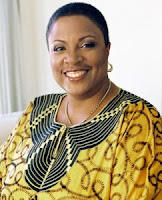Where the Edge Gathers is quite a remarkable book, which is really no surprise considering that it's written by Bishop Flunder of the City of Refuge United Church of Christ.
"In Where The Edge Gathers, Flunder uses examples of persons most marginalized by church and society to illustrate the use of "village ethics" -- knowing where the boundaries are when all things are exposed--and "village theology" -- giving everyone a seat at the central meeting place or welcome table. Flunder focuses on the following marginalized groups: Same-sex couples, to convey the need to re-examine sexual and relational ethics, Transgendered persons, to illustrate the importance of radical inclusivity, Gay persons living with AIDS, to emphasize the need to de-stigmatize societies view of any group of people."
(source)
Flunder's book is divided into two main parts: the first contains four chapters on community, and the second contains nineteen sermons, given as an example of "one tool that defines, reinforces, and supports the collective theology of the community." I recommend it as an excellent book on the topic.
 When you read Where the Edge Gathers, be sure to read the introduction as well, which includes the following:
When you read Where the Edge Gathers, be sure to read the introduction as well, which includes the following:[The European explorers and missionaries] did not acknowledge the great gift of village life: to know and be known, to see and be seen frees one from the preoccupation of pretense. The church of Jesus Christ has been colonized in much the same way, by a dominant culture that would change the radical inclusive ministry of Jesus into one that encourages people to hide their "unacceptable" realities in order to be embraced. Adherence to the rules of the dominant culture is not freedom. Marginalized people must seek freedom from a belief that says, "There is no community outside of the dominant culture; therefore, to have community one must assimilate." External assimilation does not make one a part of community; it simply covers up our reality and gives us license to act like someone we are not.
What do people do when the dominant society forces them to the margin? In order for visibly marginalized people to have real community, they must develop community while exposed-naked, with their "marginality" in full view-often learning to celebrate the very thing that separates them from the dominant culture. In recent years many aboriginal and indigenous people have increased their cultural pride and identity by celebrating the way of life lived in their villages before the colonials came.
(page xii)


where can i find a list of the 12 steps/principles for radical inclusivity
ReplyDeleteI have another post that lists these 12 key points:
ReplyDeletehttps://exclusionandembrace.blogspot.com/2015/10/twelve-key-points-about-radical.html
For more detail, see the appendix in the book itself.